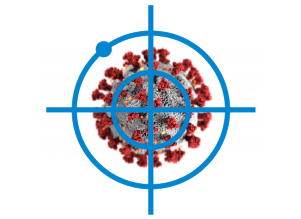 Anti- SARS-CoV-2 antibodies produced by the human immune system are key to:
Anti- SARS-CoV-2 antibodies produced by the human immune system are key to:
- Serological tests, which identify past exposure;
- Convalescent plasma, which can be used to treat COVID-19 patients;
- Protection of healthy individuals, after vaccination.
In this installment of the “Coronavirus in the crosshairs” series, The Antibody Society provides updates on the status of anti-SARS-CoV-2 antibody tests, plasma-based therapeutics, and vaccines.
Serological tests
Detection of anti-SARS-CoV-2 antibodies in the blood of healthy people is critical to determining:
- Who has previously been exposed to the virus, and may be able to resume work;
- Who can donate plasma that may be a treatment for COVID-19 patients.
To be useful, however, serological tests must be accurate and reliable, which is typically evaluated by regulatory agencies based on data submitted to them by test developers. In response to the public health emergency caused by SARS-CoV-2 in the US, the Food and Drug Administration (FDA) issued guidance on COVID-19 diagnostic tests and initiated a virtual Town Hall Series on the immediately in effect guidance. Guidance issued February 29, 2020 describes FDA’s policy regarding laboratories immediately using tests they developed and validated while pursuing an emergency use authorization (EUA). Guidance updated March 16, 2020 describes additional policies regarding manufacturers immediately distributing tests they validated while pursuing an EUA and regarding certain serology tests.
To date, one serological test intended for use by clinical laboratories has been granted a EUA by FDA. On April 1, 2020 Cellex Inc. received an EUA for the qSARS-CoV-2 IgG/IgM Rapid Test, which is a qualitative test for the detection of IgM and IgG antibodies against SARSCoV-2 in serum and plasma blood specimens and venipuncture whole blood specimens collected from individuals suspected of COVID-19 by their healthcare provider. According to FDA’s April 7, 2020 update, over 70 test developers have notified the agency that they have serological tests available for use.
Further information about FDA’s Guidance on Coronavirus (COVID-19) Diagnostic Tests, including slides and transcripts from the virtual Town Hall Series can be found here.
Convalescent plasma
Plasma from patients who recover from infectious diseases, including SARS and Ebola, contains antibodies that can used to treat patients with the infections. Preliminary reports (Shen et al. study of 5 patients; Duan et al. study of 10 patients) suggest that plasma from COVID-19 patients who recovered, i.e., convalescent plasma, may benefit patients who are critically ill with the disease.
Early in the pandemic, numerous companies announced initiatives to develop convalescent plasma-based products, also known as hyperimmune therapies, for COVID-19. More recently, however, 6 companies (Biotest AG, Bio Products Laboratory, CSL Behring, LFB, Octapharma and Takeda Pharmaceutical Company Limited) have announced that they are collaborating to accelerate development of potential COVID-19 hyperimmune therapy. The alliance will develop one, unbranded anti-SARS-CoV-2 polyclonal hyperimmune immunoglobulin medicine with the potential to treat patients with serious complications from COVID-19.
Academic organizations and hospitals are also working together to develop convalescent plasma therapy. The National COVID-19 Convalescent Plasma Project comprises a group of physicians and scientists from 57 institutions in 46 states who self-organized to investigate the use of convalescent plasma in the current COVID-19 pandemic. The Mayo Clinic will be the lead institution providing coordinated access to investigational convalescent plasma for hospitalized patients with severe or life-threatening COVID-19, or those at high risk of progression to severe or life-threatening disease.
Regardless of the source of the material, well-controlled clinical trials must be conducted to rigorously evaluate the safety and efficacy of COVID-19 convalescent plasma. Such studies, sponsored by numerous organizations, are now on-going.
FDA’s recommendations for investigational COVID-19 convalescent plasma, including discussion of pathways for its use, can be found here.
Vaccines
Many organizations are conducting research on SARS-CoV-2 vaccines, and their efforts are yielding vaccine candidates that are now entering clinical study. For example, INOVIO Pharmaceuticals, Inc. announced that a clinical study for DNA vaccine candidate INO-4800 will begin this week. The Phase 1 open-label study (NCT04336410) will evaluate the safety, tolerability and immunogenicity of INO-4800 in healthy volunteers. Other vaccines in clinical studies include:
- Moderna’s candidate mRNA-1273 (NCT04283461)
- CanSino Biologics’ candidate Ad5-nCoV (NCT04313127; ChiCTR2000030906)
- The University of Oxford’s candidate ChAdOx1 (NCT04324606; start of enrollment announced March 27, 2020)
Additional vaccine candidates are expected to enter clinical studies in the next 3-4 months.
Substantial funding for vaccine development is being provided by non-profit organizations such as the Coalition for Epidemic Preparedness Innovations and the Bill & Melinda Gates Foundation. Extraordinary measures have been proposed to accelerate the process so that vaccines are available as quickly as possible. For example, in an interview conducted by Trevor Noah, Bill Gates stated that his Foundation could fund factories for simultaneous production of 7 vaccine candidates (at ~18min 30sec of the 22min interview).

